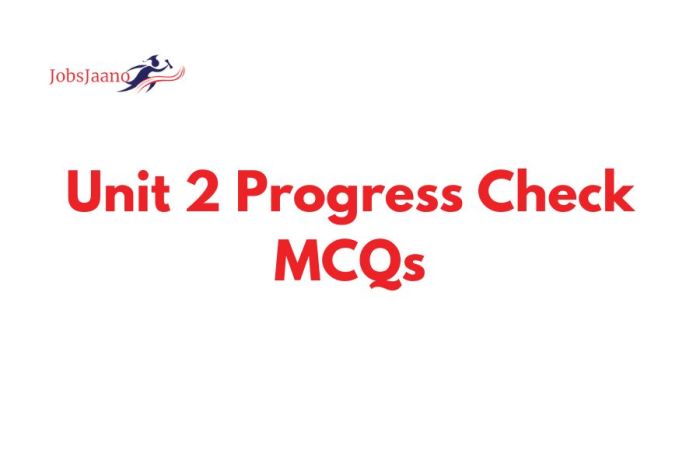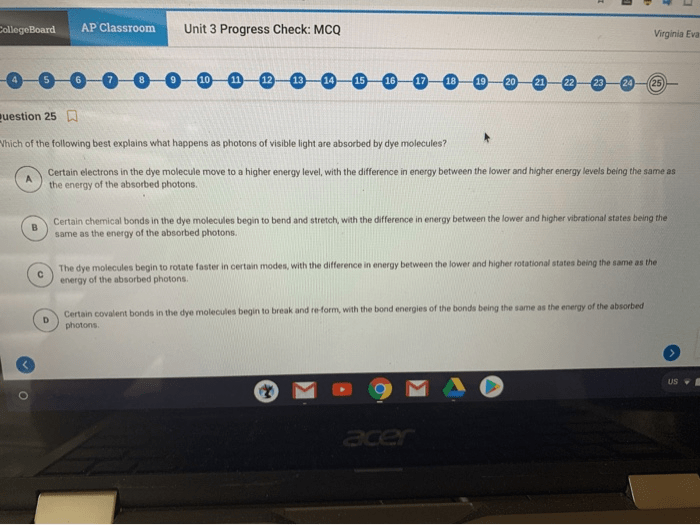Unit 9 progress check mcq ap chem – Unit 9 Progress Check MCQs in AP Chemistry present a crucial opportunity for students to assess their understanding of key chemical principles. This guide provides an in-depth analysis of the MCQ format, content, and strategies for success, empowering students to excel in this essential assessment.
Delving into the intricacies of chemical reactions, equilibrium, and thermodynamics, this guide offers a comprehensive review of Unit 9 topics, equipping students with the knowledge and skills to confidently navigate the progress check MCQs.
Conceptual Overview of Unit 9

Unit 9 of AP Chemistry explores the fundamentals of chemical reactions and equilibrium. It introduces key concepts such as reaction rates, equilibrium constants, and thermodynamics, which provide a framework for understanding how chemical reactions behave and how to predict their outcomes.
This unit also examines the relationship between equilibrium and reaction conditions, as well as the applications of equilibrium principles in various fields.
Examples of chemical reactions and processes related to Unit 9 concepts include:
- The Haber process for the synthesis of ammonia
- The combustion of hydrocarbons
- The dissociation of acids and bases
- The formation of precipitates
Understanding the topics covered in Unit 9 is essential for developing a comprehensive understanding of chemical principles. These concepts are foundational for further studies in chemistry and related fields, and they provide a basis for interpreting and predicting the behavior of chemical systems.
Multiple Choice Questions (MCQs)
The MCQs in the Unit 9 progress check are designed to assess students’ understanding of the key concepts covered in the unit. The questions are typically in a multiple-choice format, with four or five answer choices. The questions may vary in difficulty, from basic recall of facts to more complex application of concepts.
Common question types in Unit 9 MCQs include:
- Identifying the type of reaction
- Predicting the products of a reaction
- Calculating reaction rates
- Determining equilibrium constants
- Applying thermodynamic principles to chemical reactions
To answer MCQs effectively, students should:
- Read the question carefully and identify the key concept being tested.
- Eliminate answer choices that are clearly incorrect.
- Consider all the remaining answer choices and select the one that best fits the question.
- Use the process of elimination to narrow down the choices.
Time management is also crucial during the progress check. Students should allocate their time wisely, spending more time on questions that they are confident in and less time on questions that they are unsure of. They should also be strategic in their question selection, starting with questions that they are most familiar with.
Content Review for MCQs
The following topics are typically covered by the MCQs in Unit 9:
- Reaction rates
- Equilibrium constants
- Thermodynamics
- Acids and bases
- Solubility
Key equations, formulas, and concepts related to these topics include:
- Rate law expressions
- Equilibrium constant expressions
- Gibbs free energy equation
- pH and pOH calculations
- Solubility product constants
Students should create a study guide or table that organizes this information for easy reference. This will help them to quickly locate and review the key concepts needed to answer the MCQs.
Practice and Analysis of MCQs

To prepare for the Unit 9 progress check, students should practice solving MCQs. The following are some practice questions:
- Which of the following is a factor that affects the rate of a chemical reaction?
- What is the equilibrium constant expression for the following reaction: A + B <=> C
- Calculate the Gibbs free energy change for the following reaction: A + B <=> C
Answer keys and explanations for these questions are provided below:
- Temperature, concentration of reactants, surface area of reactants
- K = [C]/([A][B])
- ΔG = ΔH
TΔS
Students should also review common misconceptions and areas where they may struggle. For example, students often confuse the rate law expression with the equilibrium constant expression. They may also have difficulty applying thermodynamic principles to chemical reactions.
Exam Preparation Strategies
To prepare for the Unit 9 progress check, students should:
- Review the course syllabus and make a study plan.
- Identify areas for improvement based on practice MCQs.
- Review notes and textbooks.
- Memorize key equations and formulas.
- Practice solving MCQs under timed conditions.
- Get a good night’s sleep before the exam.
During the exam, students should:
- Read the instructions carefully.
- Manage their time wisely.
- Answer the questions to the best of their ability.
- Check their work before submitting the exam.
Top FAQs: Unit 9 Progress Check Mcq Ap Chem
What is the significance of Unit 9 topics in AP Chemistry?
Unit 9 topics lay the foundation for understanding advanced chemical concepts and their applications in real-world scenarios.
How can I effectively prepare for the Unit 9 Progress Check MCQs?
Regular practice, thorough content review, and strategic question selection are key to success in the progress check MCQs.
What are common misconceptions associated with Unit 9 concepts?
This guide addresses common misconceptions and provides clear explanations to help students avoid pitfalls.